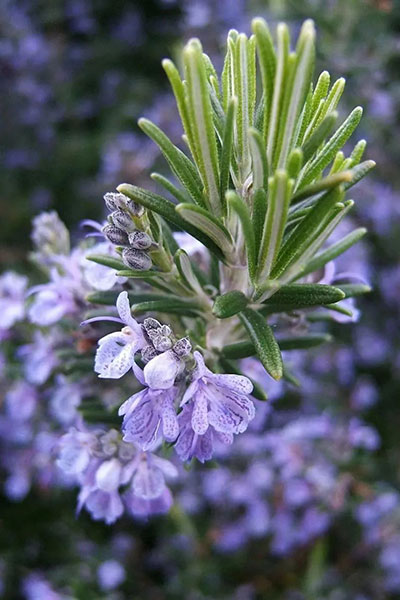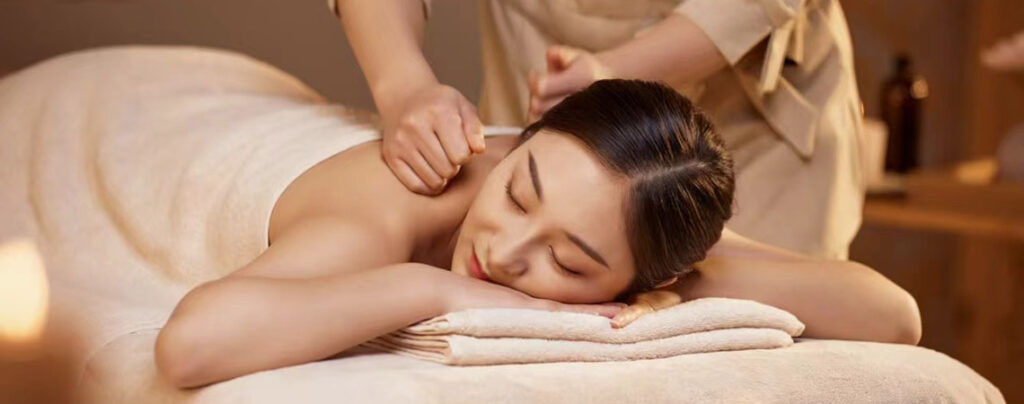What Is Aromatherapy?
Aromatherapy is a holistic healing practice that uses natural plant extracts, known as essential oils, to promote physical and emotional well-being. These oils are extracted from various parts of plants, including flowers, leaves, bark, and roots, and are used in various ways such as inhalation, topical application, and sometimes ingestion. Aromatherapy is believed to work by stimulating the smell receptors in the nose, which then send messages through the nervous system to the brain. This practice can help reduce stress, alleviate pain, improve sleep, and enhance mood. It is commonly used in massage therapy, diffusers, and skincare products.

The mechanism of action of aromatherapy
1) Olfactory Pathway:
When essential oils are inhaled, volatile molecules travel through the nasal passages and bind to olfactory receptors in the nose. These receptors send signals directly to the olfactory bulb in the brain, which then processes the scent information. The olfactory bulb has direct connections to the limbic system, including the amygdala and hippocampus, regions that are crucial for emotion regulation and memory formation. This pathway explains why certain scents can trigger emotional responses or memories, and why aromatherapy can influence mood and reduce stress.
2) Skin Absorption:
Essential oils can also be applied topically and absorbed through the skin. The small, lipophilic molecules of essential oils penetrate the skin’s barrier and enter the bloodstream. Once in the bloodstream, they can exert systemic effects, such as reducing inflammation, relieving pain, and improving circulation. The absorption can be enhanced through methods like massage, which increases blood flow and promotes deeper penetration of the oils.
3) Neurochemical Interaction:
Aromatherapy may also influence the production of neurotransmitters and hormones. For example, lavender oil has been shown to increase serotonin levels, promoting relaxation and improved mood. Other oils, like peppermint, can stimulate the nervous system, enhancing alertness and cognitive function.
What groups of people are suitable for aromatherapy ?
1) Stress Reduction and Relaxation
Aromatherapy is widely known for its ability to reduce stress and promote relaxation. Essential oils like lavender, chamomile, and bergamot have calming properties that help alleviate anxiety and induce a sense of tranquility. Inhalation of these oils can stimulate the limbic system in the brain, which is responsible for emotions, fostering a state of calm and relaxation.
2) Pain Management
Essential oils such as peppermint, eucalyptus, and rosemary possess analgesic and anti-inflammatory properties that can aid in pain relief. When applied topically in diluted form or used in massages, these oils can help reduce pain and inflammation associated with conditions like arthritis, muscle soreness, headaches, and menstrual cramps. Aromatherapy provides a natural alternative for pain management without relying on pharmaceuticals.
3) Improved Sleep Quality
Aromatherapy can enhance sleep quality by creating a relaxing environment and reducing factors that interfere with sleep, such as stress and anxiety. Essential oils like lavender, cedarwood, and valerian root are known for their sedative effects, helping to induce sleep and improve its quality. Using a diffuser in the bedroom or adding a few drops of essential oil to a pillow can create a soothing atmosphere conducive to restful sleep.
4) Enhanced Mood and Emotional Well-being
Aromatherapy can positively impact mood and emotional health. Citrus oils like lemon, orange, and grapefruit are uplifting and energizing, helping to combat feelings of depression and fatigue. Oils like rose and ylang-ylang promote happiness and reduce anxiety symptoms, making aromatherapy a valuable tool in managing mood swings and enhancing emotional well-being.
Examples of the efficacy of aromatherapy essential oils
1) Stress and Anxiety Reduction:
Lavender oil is well-documented for its calming effects. Studies have shown that inhaling lavender can reduce anxiety and stress levels in patients undergoing medical procedures, such as surgery or dental work. It has also been found effective in improving sleep quality in individuals with insomnia .
2) Pain Management:
Peppermint oil is frequently used for its analgesic properties. Research indicates that topical application of peppermint oil can significantly reduce headache symptoms and migraines .
3) Respiratory Health:
Eucalyptus oil is beneficial for respiratory issues, including asthma and bronchitis. Its decongestant properties help clear airways, making it easier to breathe. Inhalation of eucalyptus oil can reduce symptoms of respiratory conditions and improve overall lung function .
4) Skin Care:
Tea tree oil is widely recognized for its antimicrobial and anti-inflammatory properties. It is effective in treating acne, reducing the severity and number of acne lesions. Additionally, it can be used to treat minor cuts and wounds due to its antiseptic qualities .
5) Nausea and Digestive Health:
Ginger and peppermint oils are effective in reducing nausea and vomiting, particularly in patients undergoing chemotherapy or post-operative care. Inhalation or topical application of these oils can significantly alleviate nausea symptoms.,etc.

What are the three types of aromatherapy?
1) Aesthetic Aromatherapy: This type focuses primarily on enhancing the sensory experience and personal care. It is often used in spas, beauty salons, and home settings. The goal is to promote relaxation, rejuvenation, and emotional well-being through pleasant scents. Essential oils are commonly incorporated into products like lotions, bath salts, and candles.
2) Clinical Aromatherapy: Clinical aromatherapy is practiced in healthcare settings, such as hospitals and clinics. It involves the use of essential oils for specific medical conditions under the guidance of trained professionals. This type aims to complement conventional medical treatments and address issues such as pain, infection, and anxiety. Evidence-based protocols and safety guidelines are strictly followed to ensure therapeutic efficacy and patient safety.
3) Holistic Aromatherapy: Holistic aromatherapy takes a more comprehensive approach, considering the physical, emotional, and spiritual aspects of the individual. Practitioners use essential oils to create personalized treatment plans that address the root causes of health issues. This type often involves a combination of inhalation, topical application, and sometimes dietary modifications to support overall well-being.
Does aromatherapy really work?
The question of whether aromatherapy really works is complex, as it largely depends on the condition being treated and the quality of the essential oils used. Scientific studies have shown mixed results, with some providing strong evidence for the benefits of aromatherapy. For instance, a review published in the journal “Evidence-Based Complementary and Alternative Medicine” found that aromatherapy can be effective in reducing anxiety, improving sleep quality, and alleviating pain. However, the mechanisms by which essential oils exert their effects are not fully understood, and more rigorous research is needed to establish definitive conclusions.

What are the pros and cons of aromatherapy?
Pros:
1) Non-Invasive: Aromatherapy offers a non-invasive method to support health and well-being.
2) Versatile: Essential oils can be used in various ways, including inhalation, topical application, and diffusion.
3) Few Side Effects: When used correctly, essential oils typically have few side effects compared to pharmaceutical drugs.
4) Holistic Approach: Aromatherapy addresses both physical and emotional aspects, promoting overall well-being.
Cons:
1) Lack of Regulation: The quality and purity of essential oils can vary widely, as the industry is not well-regulated.
2) Allergic Reactions: Some individuals may experience allergic reactions or skin sensitivities to certain oils.
3) Limited Scientific Evidence: While there is growing research, more high-quality studies are needed to fully understand the efficacy and safety of aromatherapy.
What is the difference between essential oils and aromatherapy?
Essential oils are concentrated plant extracts obtained through processes like distillation or cold pressing. They contain the essence of the plant’s fragrance and properties. Aromatherapy, on the other hand, is the practice of using these essential oils for therapeutic purposes. While essential oils are the primary tools of aromatherapy, their mere possession does not constitute aromatherapy. The practice involves the knowledgeable application of these oils in a manner that promotes health and well-being, often guided by a practitioner.
Is perfume good for mental health?
Perfume, while primarily used for its pleasant scent, can have an impact on mental health. Fragrances can evoke memories and emotions, influencing mood and psychological well-being. Studies have shown that pleasant scents can improve mood, reduce stress, and even enhance cognitive performance. However, the effects of perfume on mental health are not as extensively studied as those of essential oils used in aromatherapy. Perfume formulations often contain synthetic compounds, which can cause sensitivities in some individuals. Therefore, while perfume can contribute to a positive mental state, it should be used with awareness of personal sensitivities and preferences.
Conclusion
Aromatherapy is a versatile and multifaceted practice with roots in ancient traditions and applications in modern healthcare. It encompasses three main types: aesthetic, clinical, and holistic aromatherapy, each with unique approaches and goals. While the efficacy of aromatherapy varies depending on the condition treated, there is promising evidence supporting its use, particularly for anxiety. The practice has its pros and cons, and understanding the difference between essential oils and aromatherapy is crucial for effective and safe use. As interest in natural and holistic therapies continues to grow, aromatherapy stands out as a complementary approach to enhancing overall well-being.

